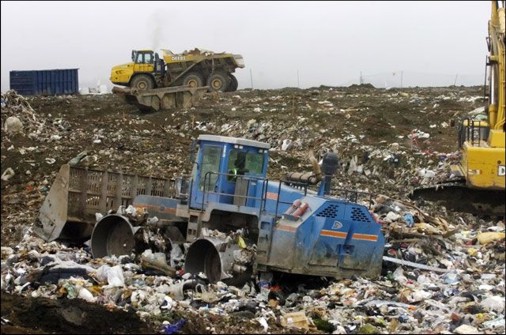 A NYS landfill. Provided by the Concerned Citizens of Cattaraugus County, Inc
A NYS landfill. Provided by the Concerned Citizens of Cattaraugus County, Inc
ALBANY, N.Y. — Statewide plastic bag recycling legislation has just been signed by New York State Governor David A. Patterson. The legislation was co-sponsored by Assemblyman Robert K. Sweeney (A. 11725) and State Senator Carl L. Marcellino (S. 8643-A).
The introductory clause of this legislation states that “Each year an estimated 500 billion to one trillion plastic bags are used worldwide…and of which billions of bags end up as litter each year.
Most plastic carryout bags do not biodegrade which means that the bags break down into smaller and smaller toxic bits that contaminate the soil and waterways, and enter into the food web when animals accidentally ingest those materials.
It is the intent of this legislation to encourage the use of reusable bags by consumers and retailers, and to encourage the reduced consumption of single-use bags.” This legislation will go into effect on January 1, 2009.
All food establishments will be exempt from this law. In addition, New York City will also be exempt because it passed a similar and slightly more stringent legislation in January of last year. All other municipalities in the state will have to comply with the legislation.
More specifically, this legislation will effect stores that have over 10,000 square feet of retail space, and chain stores with five or more locations that are under “common ownership and management,” with each having 5,000 square feet of retail space.
This legislation will also apply to the owners of enclosed shopping malls. Stores within an enclosed shopping mall that are at least 50,000 square feet will be required to comply with this legislation as well.
Effected retailers must provide consumers with the opportunity to purchase reusable bags within their stores. They will also be required to provide at-store programs for customers to return clean “plastic carryout bags” and “film plastics” to recycling bins that are “visible, easily assessable, and clearly marked” for their purpose, according to the legislation.
The plastic bags themselves must also be labeled in at least a ½ inch of print that consumers are encouraged to “PLEASE REUSE OR RECYCLE AT A PARTICIPATING STORE” or some language similar to it. Effected retail stores will have a year from the effective date of the legislation to use up their existing stock of plastic carryout bags.
Enclosed mall owners will be required to place bins at “reasonable intervals” throughout the enclosed mall areas. Effected stores within enclosed shopping malls will have to provide plastic bag return bins within their establishments.
In non-technical terms, plastic carryout bags are those plastic shopping bags that consumers get at stores. Film plastics are things like dry cleaning bags, shrink-wraps, and the bags that newspapers are wrapped in.
Prohibited from placement in the recycling bins are what are known as compostable plastics, and bins should clearly state this on their labels. The legislation technically says that compostables are plastic bags that meet the minimum D6400 standard set by the American Society for Testing and Materials. The society basically says that they are plastics that degrade at the same rate as other compostable things. From a consumer perspective, a person knows if something is a compostable bag because it is clearly marked as such when they buy it, such as some kinds of garbage bags.
Steven Liss, counsel for Assemblyman Sweeney, commented, “compostable bags are actually of a different material and actually ruin the value of recyclable plastics when mixed together for the purpose of making new plastic materials.”
The relevance of this part of the legislation is that it also calls for effected retail stores to find recycling vendors willing to pay to have the recycled materials removed so that they can be sold to manufactures to make other products.
Effected retail stores will also have to keep records of their recycling programs for a minimum of three years, tracking their collection amounts and transportation records for the recycled plastics for review upon request by the Department of Environmental Conservation.
The department has a website up to inform retail stores about the availability of recycling facilities and companies that recycle plastic bags. The following is the department’s website and two other websites that retailers may find useful:
Failure to comply with this legislation will result in a warning for a first offense, a fine of up to $100 for a second offense, and up to $500 for the third and each subsequent offense. Following a hearing, penalties under this legislation will be assessed by the commissioner of the department.
All civil penalties and fines collected for any violations of the legislation will be paid over to the commissioner for deposit in the environmental protection fund established by the state finance law.